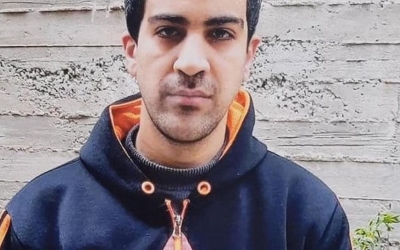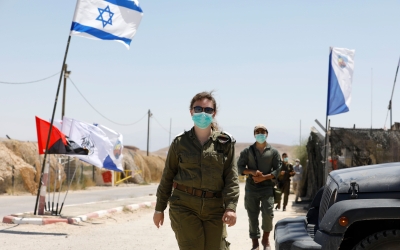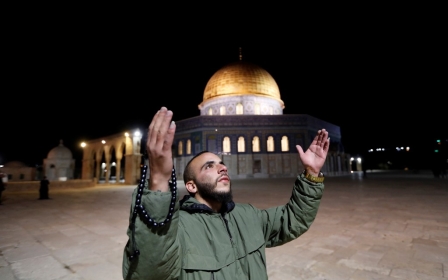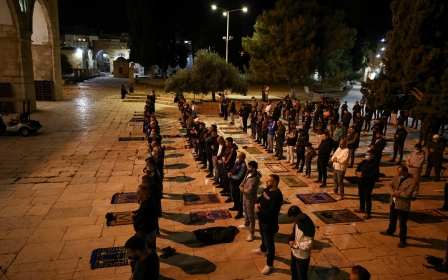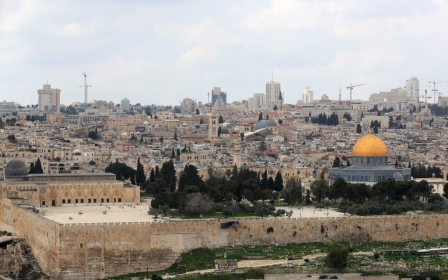Israeli settlers break into Al-Aqsa as eight Palestinians barred from accessing holy site

Tens of Israeli settlers resumed their daily raids into the Al-Aqsa Mosque compound in occupied East Jerusalem on Monday, as Israeli forces arrested 29 Palestinians from the holy city and the occupied West Bank, official Palestinian Authority news agency Wafa reported.
The Al-Aqsa compound was reopened on 31 May following a 69-day closure due to measures taken to prevent the spread of the novel coronavirus.
Late in May, Israeli and Palestinian authorities began easing their respective lockdowns following a decline in Covid-19 infections.
On Monday, around 70 Israeli settlers - led by the rightwing Knesset member Yehuda Glick - entered the Al-Aqsa compound guarded by Israeli military police, some of whom wore protective face masks.
On Sunday, Israeli authorities had handed eight Palestinians orders barring them entry to the religious compound, with the bans ranging between one week and six months.
Nasser Qaws, the Jerusalem director of the Palestinian Prisoners' Society (PPS), was barred from entering the compound for five months. He told Middle East Eye that his home in the Old City of Jerusalem was only 50 metres away from the gates of Al-Aqsa.
“The Israeli occupation wants to impose full control over all parts of the city, including the Al-Aqsa compound, and the bans for activists and Muslim figures who stand in the settlers' way are one way to do that,” Qaws said. "The plan for Al-Aqsa is to impose a temporal and spatial divide."
"It was a painful decision to hear, despite being arrested and barred many times by the (Israeli) occupation authorities. I have lived around Al-Aqsa compound since my childhood, but we will keep defending our mosque," he added.
Other prominent Palestinians to have received entry bans include activist Khadija Khweiss and one of the mosque's imams, Sheikh Ahmed Abu Ghazaleh.
Israeli forces arrested 21 Palestinians from different neighbourhoods of East Jerusalem overnight on Sunday, and another eight Palestinians in the West Bank governorates of Hebron, Jenin, Bethlehem and Nablus, as well as in the Jordan Valley, an area Israel is planning to annexe on 1 July.
In Nablus, the Israeli forces arrested a young woman while passing through the Zaatara checkpoint, Wafa reported.
Mohammed Azzam, the head of the Sebastiya municipality, told Wafa that Israeli forces arrested Lian Ahmed Kaid, a resident of the village and a recent Birzeit University graduate, while she was headed to Ramallah with her mother.
Wafa reported that at least three minors - two 16-year-olds and one 15-year-old - were detained overnight in the Bethlehem area.
On 31 May, nearly 3,500 Muslim worshippers performed the morning prayers in different areas of the Al-Aqsa compound, with social distancing measures enforced.
Israeli settlers regularly enter the Al-Aqsa Mosque compound and tour around the Dome of the Rock, a mosque built in the 7th century by the Syrian Umayyad Empire on Moriah Mount, and often perform Jewish prayers on the site, where they believe the Second Jewish Temple once stood.
Israeli far-right activists have repeatedly pushed for an increased Jewish presence at the site, despite a longstanding joint guardianship agreement between Israel and Jordan, which retains control over Christian and Muslim holy sites in Jerusalem, that bars non-Muslim prayer at the site.
The Al-Aqsa Mosque is one of the holiest sites in Islam. It was also Islam's first Qibla, the direction towards which Muslims must turn to pray, before that was changed to Mecca in what is now Saudi Arabia.
Middle East Eye propose une couverture et une analyse indépendantes et incomparables du Moyen-Orient, de l’Afrique du Nord et d’autres régions du monde. Pour en savoir plus sur la reprise de ce contenu et les frais qui s’appliquent, veuillez remplir ce formulaire [en anglais]. Pour en savoir plus sur MEE, cliquez ici [en anglais].


